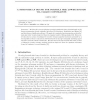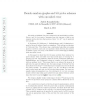106 search results - page 1 / 22 » Proving Lower Bounds Via Pseudo-random Generators |
FSTTCS
2005
Springer
13 years 10 months ago
2005
Springer
FOCS
1999
IEEE
13 years 9 months ago
1999
IEEE
Various efforts ([?, ?, ?]) have been made in recent years to derandomize probabilistic algorithms using the complexity theoretic assumption that there exists a problem in E = dti...
CSR
2011
Springer
12 years 8 months ago
2011
Springer
Abstract. Many theorems about Kolmogorov complexity rely on existence of combinatorial objects with specific properties. Usually the probabilistic method gives such objects with b...
STACS
2009
Springer
14 years 2 days ago
2009
Springer
We introduce a new technique proving formula size lower bounds based on the linear programming bound originally introduced by Karchmer, Kushilevitz and Nisan [11] and the theory of...
CORR
2011
Springer
12 years 8 months ago
2011
Springer
We study probabilistic bit-probe schemes for the membership problem. Given a set A of at most n elements from the universe of size m we organize such a structure that queries of t...


